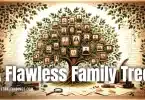You love your genealogical research. It is your passion and one of your life’s great works. You want it to endure forever, so that future generations can benefit from it and enjoy it the way you have done. Ideally, you would want to pass your work down to someone in your family, maybe one of your children or grandchildren. In a perfect world, that is what you would do, and that child or grandchild would treasure the work, add to it, and hand it down to subsequent generations, who would also appreciate and protect it.
However, as we all know, not everyone is interested in genealogy like we are. Some are not interested in it at all, while others only have a cursory interest (meaning that they are only interested in looking at someone else’s work, and don’t want to do any of their own). While they say one person is born to every generation in a family who is interested in genealogy and is the keeper of that family’s history, you cannot count on it being someone in your direct line, or even a relative you know. Even if you know someone who wants to keep and protect your genealogical work, you can’t be sure generations after them will feel the same attachment to it.
So, how can you be sure your lovingly gathered and presented genealogical work will survive the generations and be available for anyone who has an interest in it to enjoy? There are a few different ways.
Use the Internet
Thanks to modern technology, we have one more method of preserving our genealogy for future generations than previous generations did, and that is the Internet. You can make sure your genealogy work is preserved forever by uploading it online. Nothing online ever really goes away. Once you put something there, it is always there, somewhere. Future generations who have an interest will find it.
You can upload your genealogy to a variety of places, such as online family trees that are collaborative with people from around the world, subscription genealogy websites, and even your own website. The more places you put it, the better chance it has of being carefully preserved and accessible for centuries or millennia into the future.
Even if the website you originally put your research on is taken down one day, the information on it will likely be migrated to other places online, and it will definitely be archived somewhere, so it will always be findable and available. Also, other people who find your information will probably copy the parts of it that pertain to their family branches, which means you research will be found in even more places online for future generations to enjoy.
Donate Your Research
Just as our genealogically-inclined ancestors did, you can donate your research. Libraries, museums, historical societies, and local archives are all excellent places to store it, and you can be sure they will take good care of it. Just don’t assume that any place you approach will be interested in it. Space, the focus of a collection, and the availability of people to collect and process donations all play a role in whether a repository will be interested or able to take your research. In order to find the perfect place for it, you have to do some research on the repositories first.
As an example, the Family History Library in Salt Lake City, Utah, which is the largest of its kind in the world, is actually quite particular about what they will accept in terms of research. If you have written a family history book that has not been published, they will not accept it. Instead, they prefer donations of published family history books, as well as uploads of documents and sources to their FamilySearch.org website. Beyond that, they are pretty open, as they have a worldwide focus, so research on any family in any part of the world is welcome.
There are also other national archives that may be appropriate for your genealogy research, such as the New England Historic and Genealogical Society (focusing on New England genealogy) and the Daughters of the American Revolution’s library in Washington, D.C. (focusing on families with Revolutionary War ancestors). If your genealogy research is a fit for either of these, it is worthwhile to talk to them about how to present your research to them, as these groups have a national focus and attract researchers from all around the world. They are professionals and will take good care of your genealogy for generations to come.
You may consider your local genealogical or historical society, or local archives, or any of these groups in the places where your ancestors lived. The genealogies of local families are usually welcome at these places. However, you must talk to the people in charge of the genealogical collections to find out if they are accepting new work, and in what form they require it to be presented. Each place has its own rules and requirements for donated work. As an example, some (but not all) places will only accept an original record, and not copies, while some welcome copies into their collections. The key is talking to the person in charge, so you know what to do.
Don’t Wait to Plan to Protect Your Research
You’ve spent years, and maybe decades, putting your genealogical research together. Don’t wait to decide what to do with it, because you never know what might happen before you have made arrangements for its safekeeping. Certainly don’t leave it up to your family to decide, because they might not respect and protect it the way you want them to. Include your instructions for your genealogical research in your will, and make arrangements for its donation well before you ever think you will need to. Then, get to work putting it into the proper format for its future repository home. This will give you peace of mind regarding your research’s future. You will be so glad you did it.






